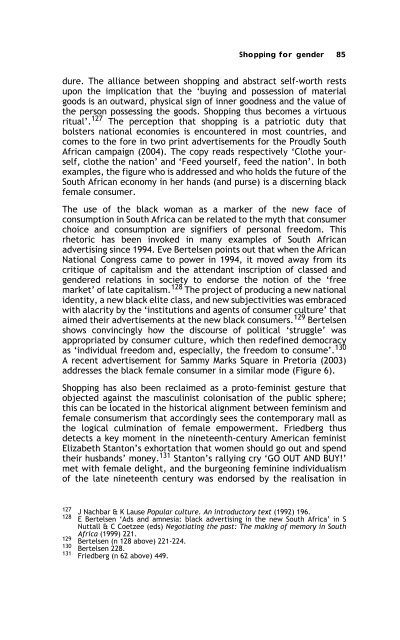Sex, Gender, Becoming - PULP
Sex, Gender, Becoming - PULP
Sex, Gender, Becoming - PULP
You also want an ePaper? Increase the reach of your titles
YUMPU automatically turns print PDFs into web optimized ePapers that Google loves.
Shopping for gender 85<br />
dure. The alliance between shopping and abstract self-worth rests<br />
upon the implication that the ‘buying and possession of material<br />
goods is an outward, physical sign of inner goodness and the value of<br />
the person possessing the goods. Shopping thus becomes a virtuous<br />
ritual’. 127 The perception that shopping is a patriotic duty that<br />
bolsters national economies is encountered in most countries, and<br />
comes to the fore in two print advertisements for the Proudly South<br />
African campaign (2004). The copy reads respectively ‘Clothe yourself,<br />
clothe the nation’ and ‘Feed yourself, feed the nation’. In both<br />
examples, the figure who is addressed and who holds the future of the<br />
South African economy in her hands (and purse) is a discerning black<br />
female consumer.<br />
The use of the black woman as a marker of the new face of<br />
consumption in South Africa can be related to the myth that consumer<br />
choice and consumption are signifiers of personal freedom. This<br />
rhetoric has been invoked in many examples of South African<br />
advertising since 1994. Eve Bertelsen points out that when the African<br />
National Congress came to power in 1994, it moved away from its<br />
critique of capitalism and the attendant inscription of classed and<br />
gendered relations in society to endorse the notion of the ‘free<br />
market’ of late capitalism. 128 The project of producing a new national<br />
identity, a new black elite class, and new subjectivities was embraced<br />
with alacrity by the ‘institutions and agents of consumer culture’ that<br />
aimed their advertisements at the new black consumers. 129 Bertelsen<br />
shows convincingly how the discourse of political ‘struggle’ was<br />
appropriated by consumer culture, which then redefined democracy<br />
as ‘individual freedom and, especially, the freedom to consume’. 130<br />
A recent advertisement for Sammy Marks Square in Pretoria (2003)<br />
addresses the black female consumer in a similar mode (Figure 6).<br />
Shopping has also been reclaimed as a proto-feminist gesture that<br />
objected against the masculinist colonisation of the public sphere;<br />
this can be located in the historical alignment between feminism and<br />
female consumerism that accordingly sees the contemporary mall as<br />
the logical culmination of female empowerment. Friedberg thus<br />
detects a key moment in the nineteenth-century American feminist<br />
Elizabeth Stanton’s exhortation that women should go out and spend<br />
their husbands’ money. 131 Stanton’s rallying cry ‘GO OUT AND BUY!’<br />
met with female delight, and the burgeoning feminine individualism<br />
of the late nineteenth century was endorsed by the realisation in<br />
127 J Nachbar & K Lause Popular culture. An introductory text (1992) 196.<br />
128 E Bertelsen ‘Ads and amnesia: black advertising in the new South Africa’ in S<br />
Nuttall & C Coetzee (eds) Negotiating the past: The making of memory in South<br />
Africa (1999) 221.<br />
129 Bertelsen (n 128 above) 221-224.<br />
130<br />
Bertelsen 228.<br />
131 Friedberg (n 62 above) 449.
















